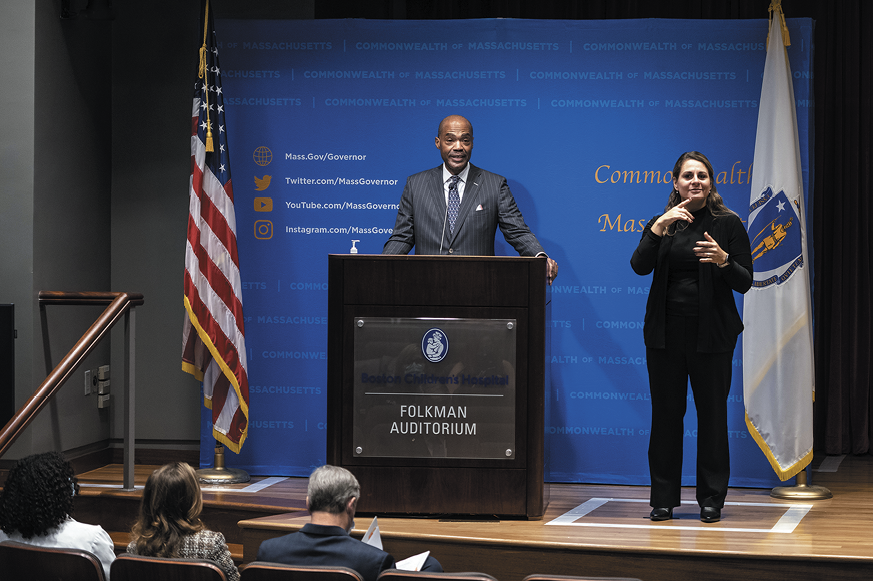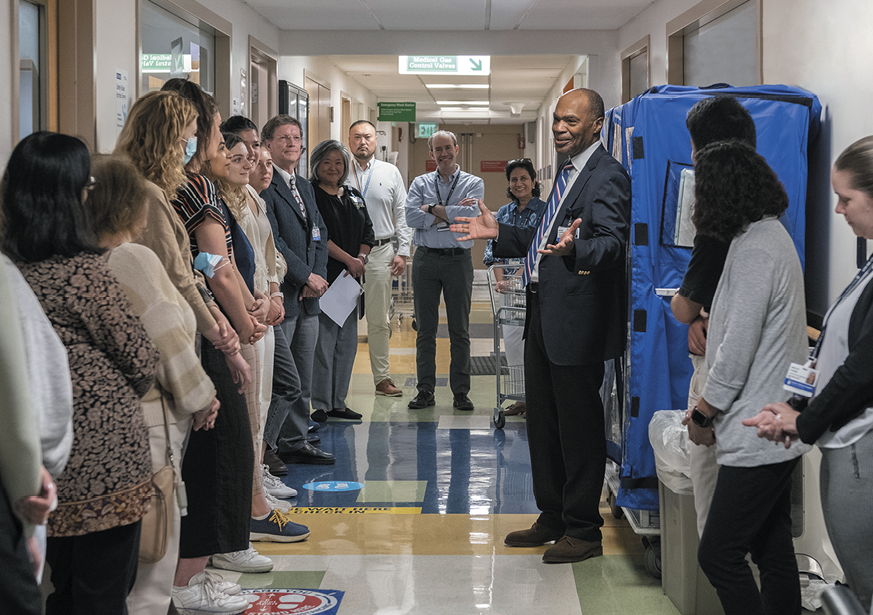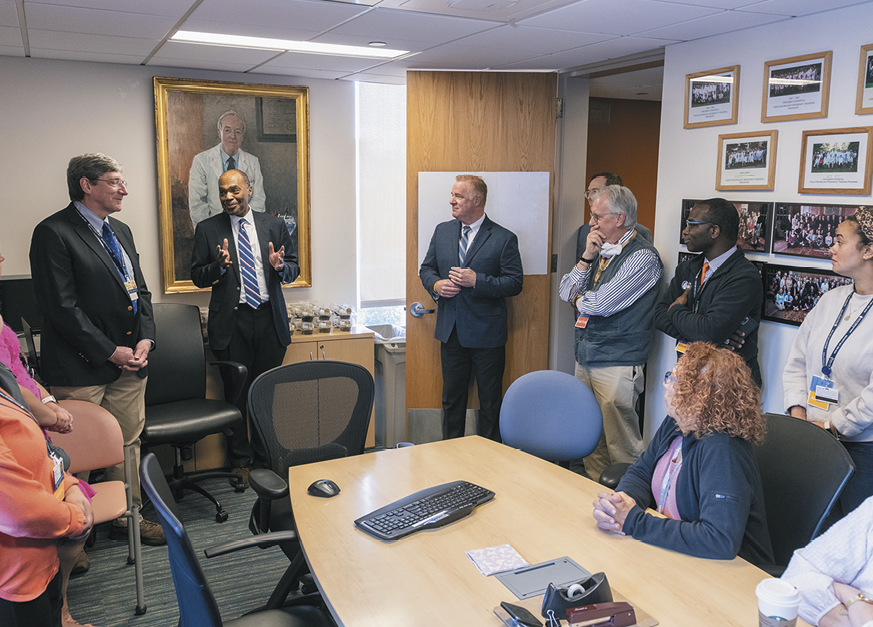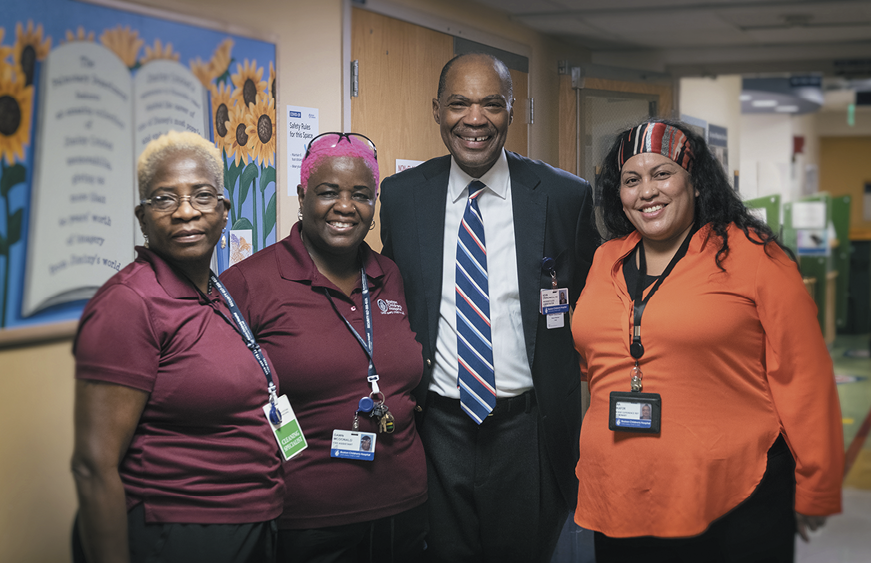- Home
- Media Kit
- MediaJet
- Current Issue
- Past Issues
- Ad Specs-Submission
- Reprints (PDF)
- Photo Specifications (PDF)
- Contact Us
- PRIVACY POLICY
- TERMS OF USE
![]()
ONLINE
![]()
ONLINE

Advancing Child Health
Editors’ Note
Kevin Churchwell is the President and Chief Executive Officer of Boston Children’s Hospital. Since joining Boston Children’s as its Executive Vice President of Health Affairs and Chief Operating Officer in 2013, Churchwell has been instrumental in leading the hospital’s work to become a High Reliability Organization, one where zero avoidable harm impacts any patient, family member, or employee. He has brought to Boston Chrildren’s the same passion for enhancing the patient family experience that defined his tenure as CEO of both Nemours/Alfred I. duPont Hospital for Children in Wilmington, Delaware, and Monroe Carell Jr. Children’s Hospital, part of the Vanderbilt University Medical Center in Nashville, Tennessee. An advocate for equity, diversity, and inclusivity, Churchwell is responsible for establishing 3 of the 11 offices of health equity and inclusion at hospitals across the U.S. and Canada, including the office at Boston Children’s, which he founded in 2016. With the publication of Boston Children’s own Declaration for Equity, Diversity and Inclusivity in 2020, Churchwell has committed to the work required to make Boston Children’s a community that’s made stronger by its differences, and a leader in equity for all. A graduate of Massachusetts Institute of Technology and Vanderbilt Medical School, Churchwell completed his pediatric residency and a clinical fellowship in Pediatric Critical Care at Boston Children’s Hospital. He is currently an Associate Professor of Pediatric Anesthesia as well as the Robert and Dana Smith Associate Professor of Anesthesia at Harvard Medical School. Churchwell is also a member of the Massachusetts Business Roundtable, a board member of the Boston Chamber of Commerce, Massachusetts Health and Hospital Association, the Whitehead Institute, Advisory Board for The Boston University School of Public Health, and the Boys and Girls Club of Boston.
Institution Brief
Boston Children’s Hospital (childrenshospital.org) is dedicated to improving and advancing the health and well-being of children around the world through its life-changing work in clinical care, biomedical research, medical education and community engagement. Boston Children’s is ranked among the best in the nation by U.S. News and World Report. It is home to the world’s largest pediatric research enterprise and is the primary pediatric teaching hospital for Harvard Medical School. Boston Children’s treats more children with rare diseases and complex conditions than any other hospital. For more than 150 years, Boston Children’s Hospital has maintained the same vision: to advance pediatric care worldwide.
Will you highlight Boston Children’s Hospital’s history and heritage?
Boston Children’s Hospital has always looked to the future. From the day we were founded in 1869, we have pursued discoveries and innovations to transform pediatric medicine and improve young lives. For example:
• We cultured the polio virus, leading to the polio vaccine and earning us the Nobel Prize
• We performed the first surgery to correct a congenital heart defect, launching the field of pediatric heart surgery
• We developed the first effective treatment for childhood leukemia, establishing chemotherapy as a mainstay of cancer treatment
• We developed the measles vaccine and earned another Nobel Prize
Our history of breakthroughs continues to drive us. The next 10 years in medicine will be transformative: our ability to cure diseases once thought incurable, like Sickle Cell Disease; advancing our treatment of rare and complex diseases, which affect more than 350 million people globally, half of whom are children; and transforming the way we approach mental illness.
We want to raise the level of healthcare for every child, no matter where they live. We have so much work to do. As my wife, Gloria, who is my partner in this work and whom I thank for her support and encouragement, likes to say: it is a privilege to be part of making a difference in children’s lives. I can’t think of a more important heritage.

Kevin Churchwell discussing Boston Children’s Hospital’s
COVID-19 vaccination program with Massachusetts health officials
How do you define Boston Children’s Hospital’s culture and values?
At the heart of who we are, what we do, and how we do it, are our culture and the values we work to uphold for our patients, families, and communities. Our culture is a collaborative, compassionate, and caring one. Our values reflect our commitment to the belief that how we work together is as important as what we do together. We work to develop and support the highest values of respect, inclusivity, teamwork, and kindness to provide patients, families, communities, and each other with an experience equal to the care we deliver.
Our culture is one of looking to the future and supporting the research, clinical innovation and excellence it takes to move our care of children to the next level.
Most important, our work is guided by our mission:
• Provide the next evolution of exceptional, innovative care
• Lead in research and discovery that supports the evolution of pediatric care and education
• Be at the forefront in educating tomorrow’s leaders in child health
• Improve the health and well-being of children and families in our communities
What have been the keys to Boston Children’s Hospital’s strength and leadership in the industry?
The most important factor has been – and remains – our people and their commitment to our mission. Whether our work is around the world or around the corner, we assign it the same level of commitment and respect. In the end, we have to succeed in every facet of our mission to maintain our leadership and effectively serve our patients, families, and communities.
We treat patients from all 50 states and more than 100 countries, and we treat more children with rare diseases and complex conditions than any other hospital in the world. While there are many people, departments, and objectives, we are one team with one common, overarching goal: to advance and improve the health and well-being of children – all children, regardless of their race, ethnicity, where they live, or who pays for their care.
Discovery and innovation are in our DNA. Each person’s work contributes to our achieving – and often exceeding – this goal, and ultimately to extending our leadership. We are always asking ourselves how we can make our children’s future the strongest and healthiest it can be.

Kevin Churchwell touring Boston Children’s Hospital
to celebrate being recognized again as one of the leading
pediatric hospitals
in the country by US News and World Report
(above and below)
What are the keys to effective leadership and how do you describe your management style?
I believe effective leadership is directly related to management style. I promote “servant leadership” in my work. To me, that means leadership that enables others to be their best selves and in doing so enables the mission of Boston Children’s Hospital. To do that well, I continue to work on being the best listener I can be in my meetings and my interactions. Active listening requires patience and engagement to get all the best ideas and thoughts before a decision is made. I also believe a leader must come with a point of view that can bring the enterprise together. I try to always look to the future, and move our incredibly vital mission forward. A leader has to make decisions, but I try to follow the advice of the great college basketball coach, John Wooden – “Be quick but don’t hurry” – in strategy, planning and engagement.
Boston Children’s Hospital is home to the world’s largest pediatric research enterprise. Will you discuss Boston Children’s investment and commitment to research?
Only through research, innovation, and discovery can we hope to cure future generations. More than 3,000 researchers work in our facilities, which encompass one million square feet of research space. Their groundbreaking work covers a wide range of specialties: revolutionizing treatments for children with common conditions, such as asthma, diabetes, and obesity, and for those with rare diseases, cancer, metabolic disease, immunologic conditions, and other complex conditions.
Our research enterprise encompasses basic, translational, and clinical research, as well as community research programs and the postdoctoral training of new scientists. Our goal is to be the recognized leader in creating and sharing knowledge to prevent, treat, and cure childhood diseases around the world. The caliber of science among our researchers is impressive and has earned national and international recognition.
Among all hospitals in the U.S., we rank fourth in research funding from the National Institutes of Health and first in pediatric research funding. Our total combined annual research funding is more than $500 million, with more than $100 million coming from generous donors who share our commitment to advancing and improving child health. They want to change the world. So do we.
When it comes to pediatric medical research, we are dedicated to the proposition that Boston Children’s is where the world comes for answers.

How is Boston Children’s Hospital supporting health equity?
Health equity for all children is an important priority for Boston Children’s. We have a very diverse patient population, and over the years, we have created a series of initiatives aimed at reducing pediatric health inequities:
• In 1968, we created one of the first community health centers in Boston
• In 2017, we created our Office of Health Equity and Inclusion
• In 2020, working with our Board of Trustees, we adopted an enterprise-wide Declaration around our health equity work, which we embedded into our overall enterprise goals
• In 2021, we created the Fenwick Institute for Pediatric Health Equity and Inclusion, which is advancing pediatric health equity by:
While we have steadily moved the ball forward, we know that there is much more to do to achieve our goal of ensuring health equity for all children. We are committed to maintaining and expanding our work, and to continuously examining what we can do to strengthen it. Every day we look to determine what the opportunities are and how we can maximize them.

Kevin Churchwell with staff members of Boston Children’s Hospital
How important is it for Boston Children’s Hospital to build a diverse and inclusive workforce?
Building a diverse and inclusive workforce is crucial for the success of Boston Children’s as we continue to welcome patients and families who represent different backgrounds and cultures. How else can we provide excellence in care without that being part of our secret sauce? Our vision is for our patients to see themselves in our workforce. Patients are more likely to trust and engage with our staff and providers who share their backgrounds and understand their needs.
A diverse workforce allows us to address the root causes of pediatric health disparities that disproportionately affect historically underserved communities. By understanding local, cultural, and socioeconomic factors that influence health, our staff and providers can shift their approach to address these disparities and promote equitable access to quality care in the communities we serve.
Bringing together individuals with diverse perspectives, experiences and backgrounds also helps us bring new approaches to problem-solving, innovation and creativity across all areas of the enterprise. We want our boardrooms, research laboratories, and operating rooms to continue to do incredible work. I have no doubt our best work will come from inclusive and diverse teams.
What do you see as Boston Children’s responsibility to be engaged in the community it serves?
Boston Children’s mission includes improving the health and well-being of children and families in our local community. Our Office of Community Health brings together hospital and community resources to address health disparities, improve health outcomes and promote health equity. Our work has included innovative models that have improved health outcomes and addressed health disparities throughout communities.
Our community efforts are focused not only on our own programs, but also on partnering with other organizations offering services that benefit children and families. We especially focus on children and families who are impacted by the negative social determinants of health, challenges that impact overall health such as poverty, living in unstable or unsuitable housing, being unemployed or underemployed, and being exposed to violence.
An example of an initiative we are proud of is the Boston Children’s Collaboration for Community Health. We launched the Collaboration in 2018, and today it is providing funding to 51 projects supporting Boston families to improve health outcomes and build healthier communities. In 2022, our Board of Trustees also approved our first Impact Investment Fund which, as part of our commitment as a Healthcare Anchor Institution, invests a portion of our endowment back into the local community.
Through these and other programs, Boston Children’s is giving community organizations more tools and resources to build a healthier future for children.
What advice do you offer to young people interested in becoming a doctor?
Whenever I speak to young people interested in becoming a doctor, I share four lessons which I have learned over the course of my career:
Lesson 1: Become the best doctor you can be. Early in my career, I didn’t have a specific, defined plan, but I did know one thing, and that one thing became my North Star: I wanted to become the best doctor I could be.
Lesson 2: Say “yes.” Also early in my career, if I was asked to start a program or fix a problem, my answer was “yes.” I have said “yes” to a lot of things throughout my career. Saying “yes” has given me experience and created opportunities. Say “yes” whenever possible.
Lesson 3: Find mentors. As I advanced into leadership roles, I realized more and more that I had an aptitude for this kind of work. More important, I found a number of mentors, and their wisdom, advice and guidance has made an enormous difference in my professional life and my career trajectory.
Lesson 4: Be flexible and appreciate your value. My final piece of advice is that things often change, and you have to be prepared for that change. Your boss can change. Your role can change. Your hospital can be acquired. You have to be flexible. And you have to appreciate your value, and that what you have to offer can be utilized by others.![]()